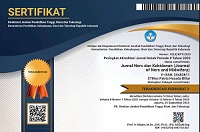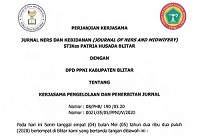Level of Online Learning Motivation in Ners Professional Students in Online Learning at University Muhammadiyah Malang
DOI:
https://doi.org/10.26699/jnk.v8i3.ART.p343-347Keywords:
COVID-19, motivation, nursing professional level, online learningAbstract
Background: Since the covid-19 pandemic occurred at the end of 2019, the education process which is usually carried out face-to-face must be done through online learning. Due to this pandemic condition, it is still difficult for Nurse Profession level students to adapt. This study was determined the level of learning motivation during online learning at the University of Muhammadiyah Malang. Method: This descriptive analytical study was analyzed by a IBM SPSS 26 version for windows. The number of respondents as many as 78 students of ners 22 class and ners 23 class was recruited by total sampling from October 2020 - January 18, 2021. The level of motivation data was identified by the Watsin questionnaire using whatsapp, zoom and google meet online platforms. Results: The 19 respondents or about 25% of participants was less than and equal to 19 years old, 22 peoples or about 28% of student nurses aged 20 years, 19 peoples or about 24% of nursing students aged 21 years, and the remaining 18 peoples or about 23% of student aged 22 years and over. The descriptive analysis showed that the average level of motivation of Nurse students during online learning was 63,14. Conclusion: the level of motivation of Nursing students during online learning in hospitals during the COVID-19 pandemic was categorized in sufficient level. The further strengthens was the needs of variety online learning model towards nursing professional level during pandemic of COVID 19.References
Al-Yateem, N., Ahmad, A. M., McCreaddie, M., & Al Hussini, L. B. E. (2021). Synthesizing core nursing skills to support behavioural-based interviews for nurses in the UAE: A nominal group study. Journal of Nursing Management, 29(5), 953–961. https://doi.org/10.1111/jonm.13232
Gaol, R. L., & Sitepu, A. (2020). The Influence of Used Good-Based Learning Media on the Value of Chracter Education and Student’s Motivation to Study. Budapest International Research and Critics in Linguistics and Education (BirLE) Journal, 3(4), 1696–1703. https://doi.org/10.33258/birle.v3i4.1299
Gelles, L. A., Lord, S. M., Hoople, G. D., Chen, D. A., & Mejia, J. A. (2020). Compassionate flexibility and self-discipline: Student adaptation to emergency remote teaching in an integrated engineering energy course during covid-19. Education Sciences, 10(11), 1–23. https://doi.org/10.3390/educsci10110304
Harapan, U. P., Cahyono, Y., Fahlevi, M., Purwanto, A., Asbari, M., Mufid, A., Agistiawati, E., & Suryani, P. (2020). Impact of Work From Home (WFH) on Indonesian Teachers Performance During the Covid-19 Pandemic : An Exploratory Study. International Journal of Advanced Science and Technology, 29(5), 6235–6244. https://www.researchgate.net/publication/341413246
Jackson, D., Bradbury-Jones, C., Baptiste, D., Gelling, L., Morin, K., Neville, S., & Smith, G. D. (2020). Life in the pandemic: Some reflections on nursing in the context of COVID-19. Journal of Clinical Nursing, 29(13–14), 2041–2043. https://doi.org/10.1111/jocn.15257
Jamaluddin, D., Ratnasih, T., Gunawan, H., & Paujiah, E. (2020). Pembelajaran Daring Masa Pandemik Covid-19 Pada Calon Guru : Hambatan, Solusi dan Proyeksi. Karya Tulis Ilmiah UIN Sunan Gunung Djjati Bandung, 1–10. http://digilib.uinsgd.ac.id/30518/
Mumtaz, N., Saqulain, G., & Mumtaz, N. (2021). Online academics in Pakistan: COVID-19 and beyond. Pakistan Journal of Medical Sciences, 37(1), 1–5. https://doi.org/10.12669/pjms.37.1.2894
Nartiningrum, N., & Nugroho, A. (2020). Online Learning amidst Global Pandemic: EFL Students’ Challenges, Suggestions, and Needed Materials. ENGLISH FRANCA : Academic Journal of English Language and Education, 4(2), 115. https://doi.org/10.29240/ef.v4i2.1494
Rahman, M. H., Rahaman, M., Rakib Nayeem, A., Uddin, M. B., & Zalil, M. A. (2020). Purchase Intention of Halal Food Among the Young University Students in Malaysia. 10(2), 7–13. https://doi.org/10.46360/globus.xxxxxxxx
Suryaman, M., Cahyono, Y., Muliansyah, D., Bustani, O., Suryani, P., Fahlevi, M., Pramono, R., Purwanto, A., Purba, J. T., Munthe, A. P., Juliana, & Harimurti, S. M. (2020). COVID-19 pandemic and home online learning system: Does it affect the quality of pharmacy school learning? Systematic Reviews in Pharmacy, 11(8), 524–530. https://doi.org/10.31838/srp.2020.8.74
Taat, M. S., & Francis, A. (2020). Factors influencing the students’ acceptance of e-learning at teacher education institute: An exploratory study in Malaysia. International Journal of Higher Education, 9(1), 133–141. https://doi.org/10.5430/ijhe.v9n1p133
Downloads
Published
How to Cite
Issue
Section
License
Copyright (c) 2021 Jurnal Ners dan Kebidanan (Journal of Ners and Midwifery)

This work is licensed under a Creative Commons Attribution-ShareAlike 4.0 International License.






